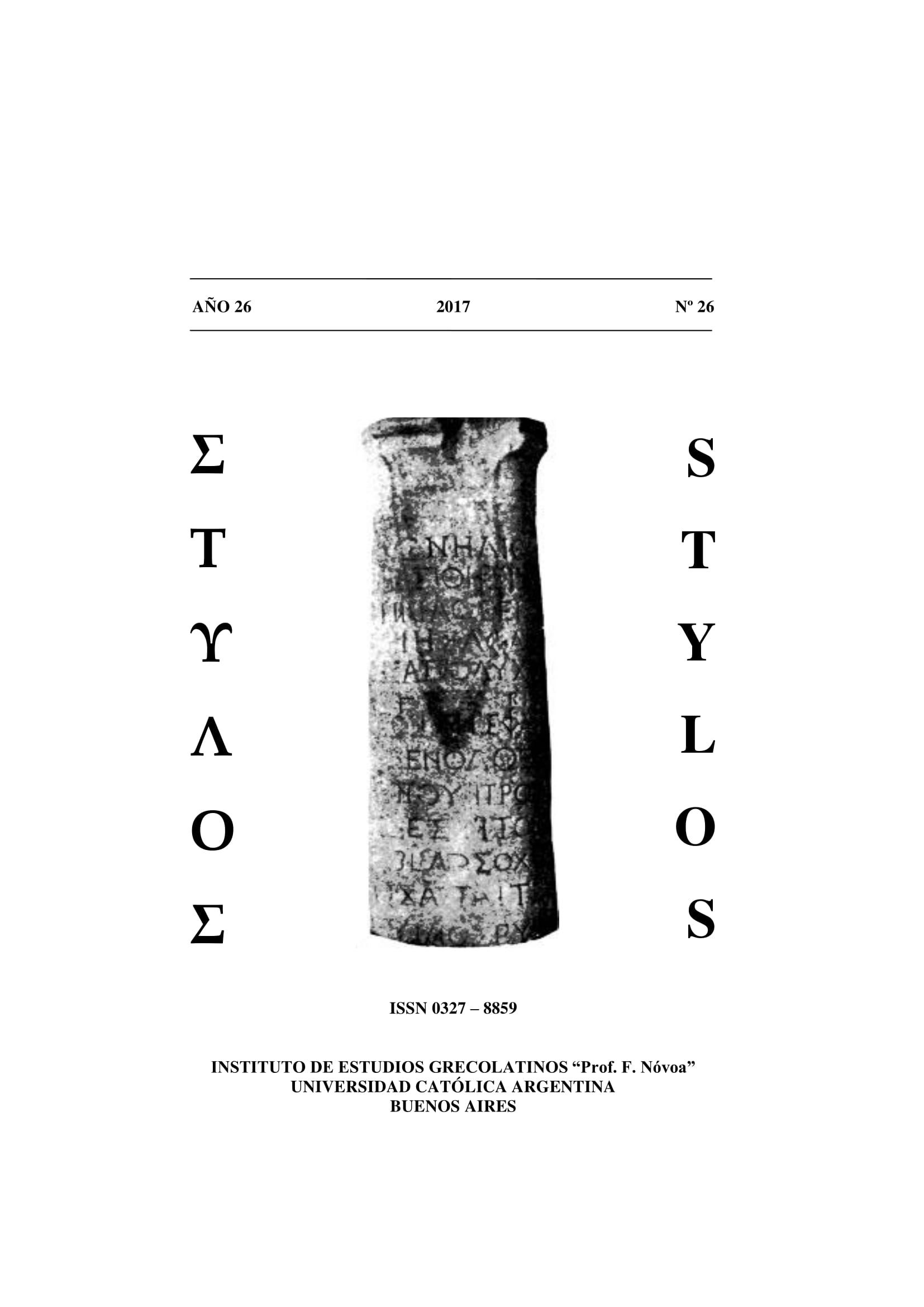EL CORPUS OVIDIANO EN UN LEXICÓN VERBAL LATINAE RADICES (LAR)
Keywords:
latin, composition, syntaxis, OvidAbstract
This paper presents the general characteristics of the LAR proyect (Latinae radices), which sets to analyze word formation in the latin language –specifically, for this sections, which data gathered from a corpus of Ovid's works– and observe, in one hand the basic composition processes and the afixation processes, whilst also those that both give origin and allow the productivity of the lexicon. Taking in account an abbreviated dictionary, it both offers the lemmatization and explicits the meanings in accord to the tradition dictionary practices. Finally, it describes the basic syntactic structures selected from the observation of the predicate frames that defines each one.Downloads
References
ALVAR, M. y B. POTTIER (1983): Morfología histórica del español. Madrid: Gredos.
BAÑOS BAÑOS, JOSÉ MIGUEL (Coord.) (2009): Sintaxis del latín clásico. Madrid: Liceus.
BASSOLS DE CLIMENT, MARIANO (1992): Sintaxis latina. Madrid: Consejo Superior de Investigaciones Científicas.
BEEKES, ROBERT S. P. (1984): Comparative indo-european linguistics: an introduction. Amsterdam / Philadelphia: John Benjamins Publishing Company.
CAMPOS SOUTO, Mar y Jesús PENA (2009): «Propuesta metodológica para el establecimiento de familias léxicas en una consideración histórica: el caso de hacer» in Cuadernos del Instituto de Historia de la Lengua. Fundación San Millán. La Rioja. Cilengua. Año II. Número 2.
ERNOUT, A. (1945) : Morphologie historique du latin. Paris: Klincksieck.
GUIRAUD, P. (1967): L’étymologie. Paris: PUF.
LLOYD, Paul M. (1993): Del latín al español. Madrid: Gredos.
MALKIEL, Y. (1996): La etimología. Madrid: Cátedra.
MEILLET, Antoine (1966): Esquisse d’une histoire de la langue latine. Paris: Klincksieck.
PENA, Jesús (1999): «Partes de la morfología. Las unidades del análisis morfológico» in BOSQUE, I. y V. DEMONTE (dirs.): Gramática descriptiva de la lengua española. Madrid: Espasa Calpe. Real Academia Española. Colección Nebrija y Bello.
PINKSTER, Harm (2015): Oxford Latin Sintax. Oxford University Press.
RIEMANN, O. (1935): Syntaxe latine. Librairie C. Paris: Klincksieck.
SIHLER, Andrew l. (1995): New comparative grammar of greek and latin. New York / Oxford: Oxford University Press.
VARELA, Soledad (1990): Fundamentos de morfología. Madrid: Síntesis.
VARELA, Soledad y Josefa MARTÍN GARCÍA (1999/2000): «La prefi-jación» in Gramática Descriptiva de la Lengua Española, dirigida por Ignacio BOSQUE y Violeta DEMONTE. Cap. 76. Madrid: Espasa Calpe.
DICCIONARIOS
BATTISTI, CARLO Y GIOVANNI ALESSIO (1954): Dizionario etimologico italiano. Firenze: Barbera.
BIEDERMANN, HANS (1993): Diccionario de símbolos. Barcelona: Pai-dós.
BLÁNQUEZ FRAILE, A. (1974): Diccionario latino-español, español-latino. Barcelona: Sopena.
BLOCH, O. y W. VON WARTBURG (1947): Dictionnaire étymologique de la langue française. Paris.
COROMINAS, JOAN (1980): Diccionario crítico-etimológico castellano e hispánico, 6 vols. Madrid: Gredos.
ERNOUT, A. y A. MEILLET (1951): Dictionnaire étymologique de la langue latine. Paris: Klincksieck.
FORCELLINI, A. (1940) : Lexicon totius latinitatis. Padua.
GRIMAL, PIERRE (1999): Diccionario de mitología griega y romana. Buenos Aires: Paidós.
HOWATSON, M. C. (1991): Diccionario de la literatura clásica. Madrid: Alianza.
MEYER-LÜBKE, W. (1935): Romanisches etymologisches wörterbuch. Heidelberg.
QUICHERAT, L. (1835): Gradus ad Parnasum. Paris: Cormon et Blanc, 2 vol.
ROBERTS, EDWARD A. Y BÁRBARA PASTOR (1997): Diccionario etimoló-gico indoeuropeo de la lengua española. Madrid: Alianza.
SEGURA MUNGUÍA, SANTIAGO (2003): Nuevo diccionario etimológico Latín-Español y voces derivadas. España: Universidad de Deusto.
Thesaurus Linguae Latinae (1900...): Leipzig: B. G. Teubner.
EDICIÓN
The Loeb Classical Library. London. Massachusetts.
Downloads
Published
How to Cite
Issue
Section
License






